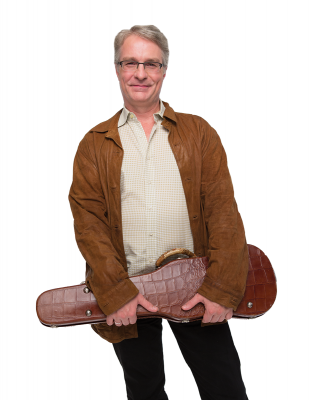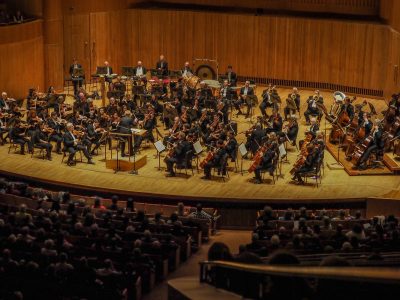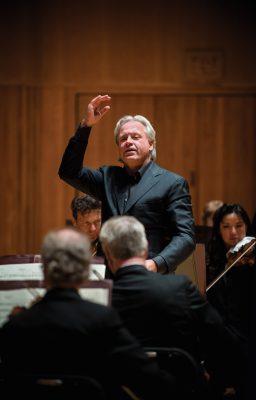That Jonathan Carney would become a musician was never in doubt. Nature as well as nurture made the outcome almost inevitable.
Both parents of the Baltimore Symphony Orchestra (BSO) concertmaster graduated from The Juilliard School; his father was lead trumpet at New York City’s Copacabana nightclub, then taught high school music, and his mother was a piano teacher, accompanist and recitalist. His brother and two sisters are violinists as well.

Ironically, the young boy’s love of baseball nurtured his music. “I started violin at 5 with my dad, then entered Juilliard at 8,” Carney said, noting that his father “encouraged me to practice both by paying me 25 cents an hour and by offering to play catch with me.”
Carney, who has played in orchestras since third grade, traces his intention to become a professional violinist to age 14. He continues to be pleased with that decision. “The profession has taken so many turns and twists for me in 40 years,” he said, “but it is pretty much what I had expected: fun and rewarding.” He credits his parents, his violin professors at Juilliard and 19 years in London orchestras for his success.
Still, the conviction that “you are only as successful as your last concert,” Carney said, “has kept me inspired and diligent in my preparation and helps keep my work ethic intact.”
Carney also plays viola, and believes that the two instruments “are so complimentary. I have tremendous respect and love for the violin as I believe it is the greatest of all instruments, but I am really in love with the viola!”
Acknowledging he does “have a certain style in my playing,” Carney noted that “it changes with your moods and with things that are going on in your life. As your life changes and evolves, so does your playing. I think I am a little wiser these days and that my playing has become more introspective with age.”
After a dozen seasons as concertmaster of London’s Royal Philharmonic Orchestra and 16 with the BSO, the role continues to challenge him. “Being concertmaster is certainly more complicated than anything else I do,” he said. “Even after 30 years of leading orchestras, I still get surprised. There is a lot that goes on both onstage and off with the BSO–lots of meetings, discussions with players, conductors and management about the day-to-day activities that occur in the orchestra.”

Maintaining that “an orchestra is a microcosm of society and many of life’s diverse personalities are present and accounted for in an orchestra,” Carney claims the BSO is “no exception … (and) that is what makes our profession so thrilling and unpredictable.”
Amazon’s television series about the inner workings of the fictitious New York Symphony does not match his real-life experience. “It’s really not like ‘Mozart in the Jungle.’ It’s actually much more dramatic than that!” he said. “It would make a great reality TV series. The stories my violin could tell.”
Principal Guest Conductor Markus Stenz will lead the BSO’s Oct. 8 concert, “Wagner’s Quest”—featuring Mendelssohn’s “The Hebrides Overture,” Bruch’s “Scottish Fantasy” and Wagner’s “Selections from Parsifal” at the Music Center at Strathmore.
“We are celebrating the romantic era in music,” said Stenz. “Wagner with highly theatrical music that enters the realm of philosophy and profound themes of life. Mendelssohn with his effortless way of making everybody fly with his music. And Bruch with the idea of a soloist in free flight playing emotional and gripping tunes.”
Stenz and Carney worked together in London in the early 1990s, when Stenz was starting out as a conductor, and they have worked together at the BSO for a few years. Carney, said Stenz “is a fantastic musician and force of energy at the podium.”
“I love music-making with Jonathan,” Stenz added. “He always plays with a beautiful sound. What makes this one special is that whereas we have oftentimes performed with him making my reading of a piece work beautifully, this time, I can tailor a performance to his creative mind. For the soloist is IT in the ‘Scottish Fantasy.’
“I know the abundance of his musical imagination, so I am really looking forward to this special occasion!”
Both musicians are especially excited about the Bruch piece. “Distinctive of the ‘Scottish Fantasy’ is indeed the freedom of imagination that is handed to the soloist: Take Bruch’s tunes and musical lines and start inhabiting them, living them! And then the orchestra can be a perfect companion for a romantic fantasy,” Stenz said.

“It showcases the violin perfectly. It is full of Scottish folk songs and has a beautifully prominent part for the harp as well,” said Carney, whose performs on a Mercur-Avery, a 1687 Stradivarius. “It’s not played as often as his first concerto, but I think it is just as great a work. I enjoy performing works that are ever so slightly off the beaten path. I believe it to be really rewarding for the audience.
“It has a very fast and exciting last movement (that) we nickname ‘scratch frantically’ instead of ‘Scottish Fantasy!”
Carney’s passion for music education translates into further commitments: he serves as artistic director of the Maryland Classic Youth Orchestras, artist in residence and board member for the Baltimore School for the Arts and is on the faculty of the Brevard Music Center.
“It’s vital that we spend as much of our time as is possible encouraging and training the youth of today in music and in orchestral playing,” Carney said. “It’s an ideal way of learning team work. It’s also a good time to build relationships, learn social graces and establish a work ethic early in your life.
“I so enjoy the time I spend with young musicians. Even if these kids do not go into music as a career, they eventually become better students, friends, colleagues and citizens because of their exposure to a youth orchestra.
What free time remains is spent “in State College, Pennsylvania, taking long walks with our German Shepherd, biking, watching baseball and travelling with my wife and fellow violinist, Julie Savignon. As well as trying to see as much of our six children as possible.”
As for his plans for his professional future, Carney said, “I have never made plans for my career, what happens happens, but I hope to continue practicing, playing, performing right to the end. I suppose the only plan I might have for the future is to never retire.”
The Baltimore Symphony Orchestra will present “Wagner’s Quest,” featuring Principal Guest Conductor Markus Stenz, Concertmaster Jonathan Carney, violin, and baritone Stephen Powell at 3 p.m. Sunday, Oct. 8 at the Music Center at Strathmore, 5301 Tuckerman Lane, North Bethesda. Tickets range from $30 to $99. An Off the Cuff presentation will include discussion, live performance and a Q&A session with Maestro Stenz at 8:15 p.m. Friday, Oct. 6. Tickets range from $35 to $82. Call 877-276-1444 or visit www.bsomusic.org. View this concert on CultureSpotMC here.